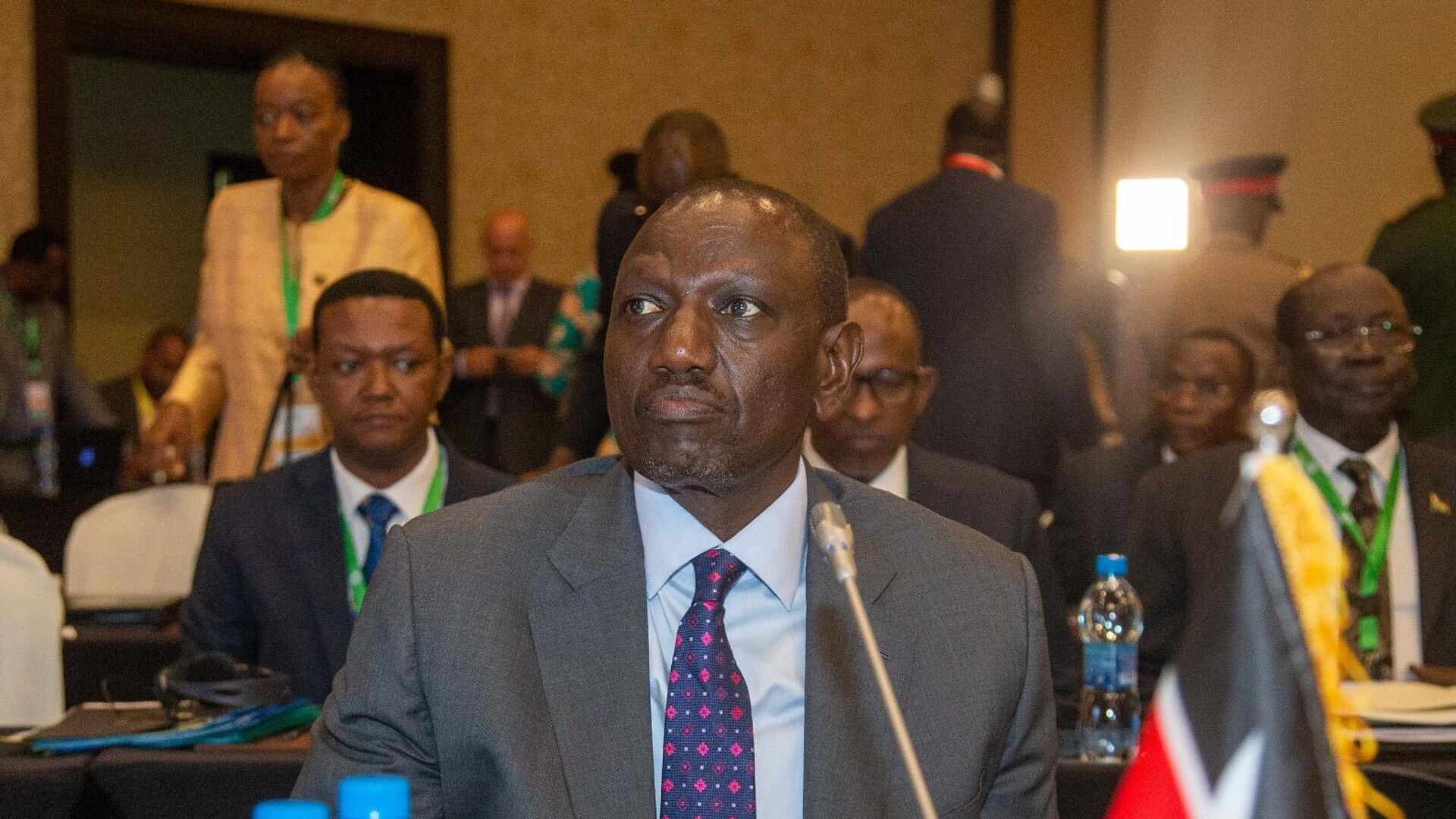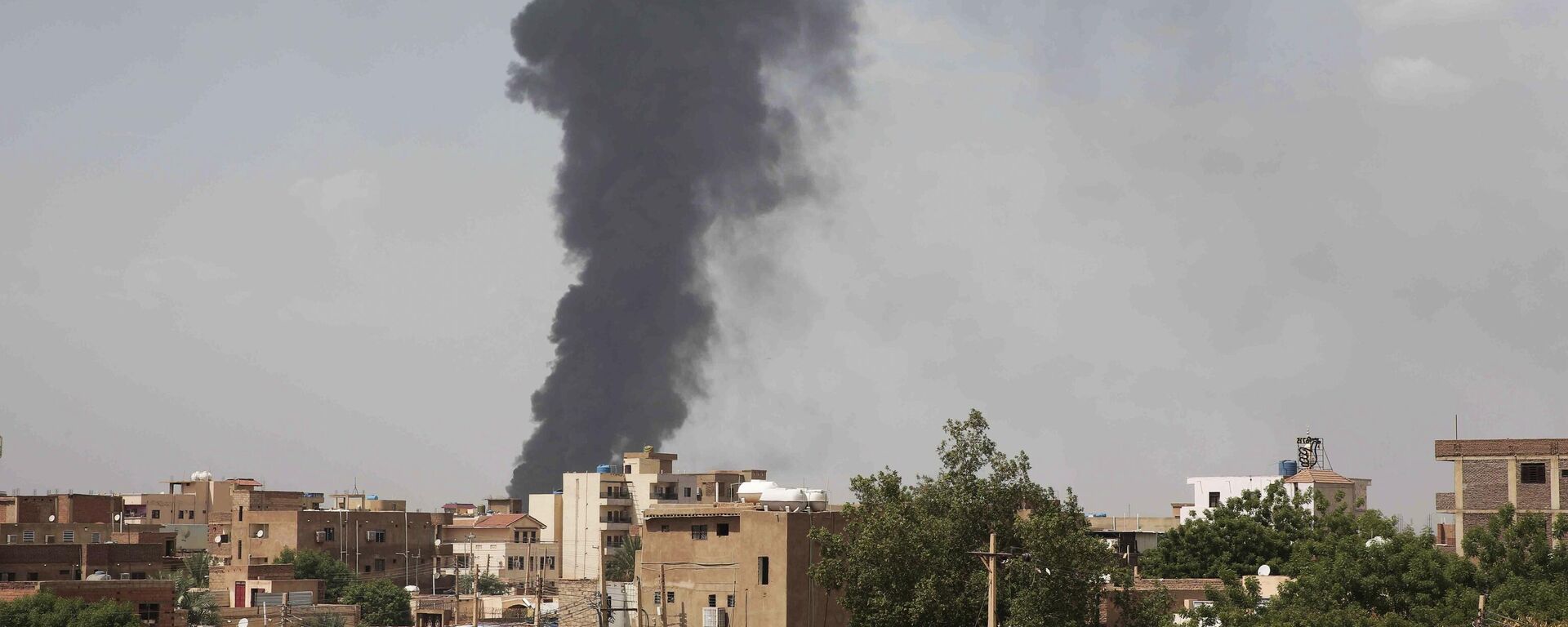https://en.sputniknews.africa/20230613/kenyas-president-vows-to-arrange-face-to-face-meeting-between-sudans-warring-generals-1059893432.html
Kenya's President Vows to Arrange Face-to-Face Meeting Between Sudan's Warring Generals
Kenya's President Vows to Arrange Face-to-Face Meeting Between Sudan's Warring Generals
Sputnik Africa
On April 15, violent clashes erupted between the Sudanese regular armed forces and the paramilitary Rapid Support Forces (RSF), with the epicenter in Sudan's... 13.06.2023, Sputnik Africa
2023-06-13T18:56+0200
2023-06-13T18:56+0200
2023-06-13T21:27+0200
armed clashes in sudan
north africa
east africa
intergovernmental authority on development (igad)
sudan
kenya
william ruto
abdel fattah al-burhan
mohamed hamdan dagalo
https://cdn1.img.sputniknews.africa/img/07e7/06/0d/1059894870_0:199:1600:1099_1920x0_80_0_0_ea89bd41ceb5b97e831601695d5fd141.jpg
Kenya has taken the initiative to mediate talks between Sudan's opposing military figures as part of an effort to resolve the ongoing crisis in the country. In a statement made by President William Ruto during the 14th Ordinary Summit of Heads of State and Government of the Intergovernmental Authority on Development (IGAD) he announced that Kenya would facilitate a face-to-face meeting between Sudanese Generals Abdel Fattah al-Burhan and Mohamed Hamdan Dagalo, commonly known as Hemedti, to find a lasting solution to the crisis.The Kenyan president also said that Nairobi and IGAD would establish a humanitarian corridor within a fortnight to facilitate the delivery of humanitarian aid to those affected by the deadly clashes.Kenya has expressed support for the expansion of the IGAD Troika on the Sudan crisis, which now includes Ethiopia and Somalia. As part of the newly formed IGAD Quartet, Kenya and South Sudan will lead efforts to find a resolution to the ongoing crisis in Sudan.Meanwhile, there is another joint peace initiative led by Saudi Arabia and the United States. The facilitators gathered the representatives of the two rival generals in the Saudi city of Jeddah. While the talks in Jeddah have not resulted in a permanent resolution, they led to several short-term ceasefires on the ground.However, situation in Sudan has been continuously marked by repeated violations of previous cease-fire agreements signed in Jeddah, with both sides blaming each other for the breaches. The ongoing conflict between the Sudanese Armed Forces (SAF), led by chairman of the Transitional Sovereignty Council General, Abdel Fattah al-Burhan, and the paramilitary Rapid Support Forces (RSF), led by his deputy General Mohamed Hamdan Dagalo, has resulted in nearly 1,000 deaths.Sudan has lacked a functioning government since al-Burhan and his now rival Dagalo dismissed Prime Minister Abdalla Hamdok's transitional government and declared a state of emergency in October 2021. The move triggered months of protests in the country and was widely condemned by political forces as a "coup."The transitional period, which started in August 2019, after the removal of General Omar al-Bashir, the nation's longtime ruler, had initially been planned to conclude with general elections in early 2024.
https://en.sputniknews.africa/20230611/clashes-resume-in-sudan-as-24-hour-ceasefire-ends-1059849976.html
north africa
east africa
sudan
kenya
Sputnik Africa
feedback@sputniknews.com
+74956456601
MIA „Rossiya Segodnya“
2023
Sputnik Africa
feedback@sputniknews.com
+74956456601
MIA „Rossiya Segodnya“
News
en_EN
Sputnik Africa
feedback@sputniknews.com
+74956456601
MIA „Rossiya Segodnya“
Sputnik Africa
feedback@sputniknews.com
+74956456601
MIA „Rossiya Segodnya“
north africa, east africa, intergovernmental authority on development (igad), sudan, kenya, william ruto, abdel fattah al-burhan, mohamed hamdan dagalo
north africa, east africa, intergovernmental authority on development (igad), sudan, kenya, william ruto, abdel fattah al-burhan, mohamed hamdan dagalo
Kenya's President Vows to Arrange Face-to-Face Meeting Between Sudan's Warring Generals
18:56 13.06.2023 (Updated: 21:27 13.06.2023) On April 15, violent clashes erupted between the Sudanese regular armed forces and the paramilitary Rapid Support Forces (RSF), with the epicenter in Sudan's capital, Khartoum. Government forces accused the RSF of mutiny and launched airstrikes against their bases. In addition, the head of the Sudanese military issued a decree disbanding the RSF.
Kenya has taken the initiative to mediate talks between Sudan's opposing military figures as part of an effort to resolve the ongoing crisis in the country.
In a statement made by President William Ruto during the 14th Ordinary Summit of Heads of State and Government of the Intergovernmental Authority on Development (IGAD) he announced that Kenya would facilitate a face-to-face meeting between Sudanese Generals Abdel Fattah al-Burhan and Mohamed Hamdan Dagalo, commonly known as Hemedti, to find a lasting solution to the crisis.
"Kenya commits to meet the two Sudan generals face to face to find a lasting solution to the crisis," Ruto said in a statement. "In the next three weeks, we will begin the process of an inclusive national dialogue."
The Kenyan president also said that Nairobi and IGAD would establish a
humanitarian corridor within a fortnight to facilitate the delivery of humanitarian aid to those affected by the deadly clashes.
Kenya has expressed support for the expansion of the IGAD Troika on the Sudan crisis, which now includes Ethiopia and Somalia. As part of the newly formed IGAD Quartet, Kenya and South Sudan will lead efforts to find a resolution to the ongoing crisis in Sudan.
Meanwhile, there is another joint peace initiative led by Saudi Arabia and the United States. The facilitators gathered the representatives of the two rival generals in the Saudi city of Jeddah. While the
talks in Jeddah have not resulted in a permanent resolution, they led to several short-term ceasefires on the ground.
However, situation in Sudan has been continuously marked by repeated violations of previous cease-fire agreements signed in Jeddah, with both sides blaming each other for the breaches.
The ongoing conflict between the Sudanese Armed Forces (SAF), led by chairman of the Transitional Sovereignty Council General, Abdel Fattah al-Burhan, and the paramilitary Rapid Support Forces (RSF), led by his deputy General Mohamed Hamdan Dagalo, has
resulted in nearly 1,000 deaths.
In addition, thousands of people have been injured since April 15, according to the Central Committee of Sudan Doctors (CCSD). Fighting has gripped the country's capital, Khartoum, and the western region of Darfur, displacing nearly two million people, including 476,000 who have sought refuge in neighboring countries, according to the United Nations.
Sudan has lacked a functioning government since al-Burhan and his now rival Dagalo dismissed Prime Minister Abdalla Hamdok's transitional government and declared a state of emergency in October 2021. The move triggered months of protests in the country and was widely condemned by political forces as a "coup."
The transitional period, which started in August 2019, after the removal of General Omar al-Bashir, the nation's longtime ruler, had initially been planned to conclude with general elections in early 2024.


